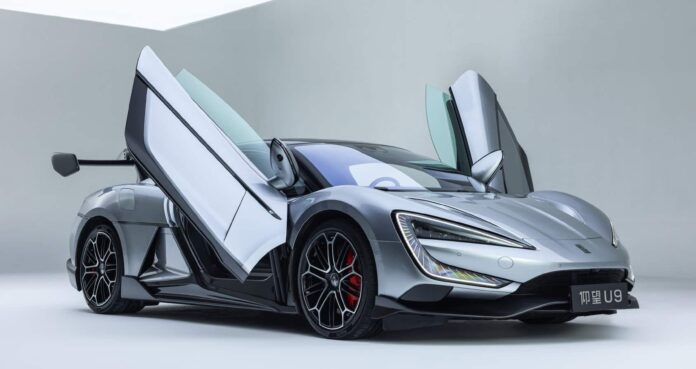- Chinese electric vehicle (EV) maker BYD has revealed its latest creation, the Yangwang U9, boasting an impressive 1,300 horsepower.
- The all-electric supercar is positioned to directly compete with renowned luxury brands like Lamborghini and Ferrari, signaling BYD’s entry into the high-performance realm.
- BYD recently surpassed Tesla as the world’s leading seller of electric vehicles, emphasizing the growing influence of Chinese automakers in the global electric automotive landscape.
The Yangwang U9 is equipped with four electric motors, facilitating all-wheel drive and enabling it to accelerate from 0 to 60 miles per hour in a mere 2.3 seconds. Priced at 1.68 million Chinese yuan, approximately $233,500 US dollars, the Yangwang U9 offers a compelling alternative to traditional gasoline-powered supercars in a similar price range. This competitive pricing strategy aligns with BYD’s disruptive approach in the electric vehicle market, prompting concerns among European automakers struggling to match such affordability.
BYD’s prowess in the EV market extends beyond supercars, with the company gaining recognition for its mainstream electric cars and SUVs like the Dolphin SUV and Seal sedan. The affordability of these models poses a significant challenge to American and European competitors, as acknowledged by Tesla CEO Elon Musk, who highlighted the potential of Chinese EV makers, including BYD, to reshape the automotive industry.
While the Yangwang U9’s acceleration capabilities draw comparisons to the Rimac Nevera, a $2 million electric hypercar with 1,800 horsepower, BYD’s offering comes at a fraction of the cost. This reinforces BYD’s disruptive impact on the pricing dynamics of electric supercars, posing a direct threat to established players like Lamborghini and Ferrari. The strategic pricing positions BYD as a formidable contender, aligning with the sentiments of Stellantis CEO Carlos Tavares, who views Chinese automakers as the primary threat due to their ability to offer electric vehicles at price points comparable to internal combustion vehicles.
Beyond raw acceleration, the supercar experience is defined by factors such as handling, driving dynamics, and overall driving pleasure. Lamborghini CEO Stephan Winkelmann has previously expressed skepticism about electric vehicle technology’s ability to deliver the desired driving experience, citing the challenges posed by heavy batteries. While Lamborghini has introduced its own electric model, the Lanzador, it deviates from the conventional two-door supercar design, opting for a larger four-door format to accommodate necessary batteries.
The Yangwang U9 seeks to address these concerns with not only remarkable speed but also a sophisticated body control system. This system allows the vehicle to be raised by three inches at any wheel, enhancing adaptability and addressing potential challenges related to road conditions. The supercar’s body is crafted from a combination of lightweight carbon fiber and aluminum, emphasizing a commitment to both performance and efficiency. According to BYD, the Yangwang U9 achieves a top speed of 192 miles per hour, further solidifying its credentials in the competitive world of high-performance electric supercars.
BYD’s foray into the low-volume, high-priced segment occupied by exotic supercars demonstrates the company’s agility and ambition to diversify its market presence. As the automotive industry undergoes a significant shift towards electric propulsion, Chinese automakers like BYD are positioned to play a pivotal role in shaping the industry’s future.
The unveiling of the Yangwang U9 serves as a testament to BYD’s commitment to innovation, challenging traditional norms, and asserting its prominence on the global stage.
BYD’s introduction of the Yangwang U9 marks a significant milestone, showcasing the company’s capability to compete in the elite realm of electric supercars. The strategic pricing, coupled with impressive performance attributes, positions BYD as a disruptive force challenging the dominance of established luxury brands. As the electric vehicle landscape continues to evolve, BYD’s ambitious endeavors underscore the transformative impact of Chinese automakers and their potential to redefine the automotive industry’s landscape.

